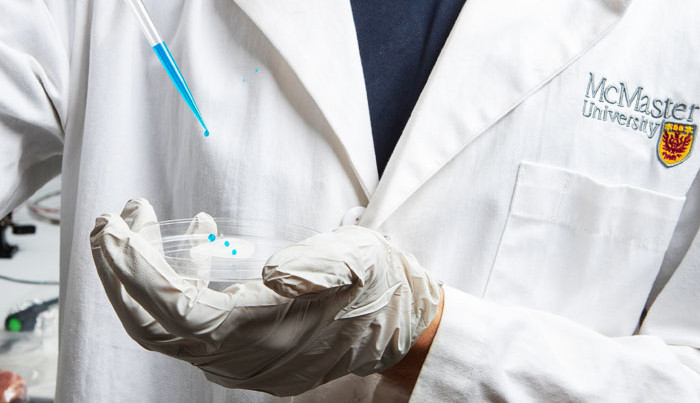A Surface Coating that Sheds Bacteria
January 21, 2020
on
on

Researchers at McMaster University have developed a self-cleaning surface to which even bacteria and viruses cannot adhere. In principle it could be used as a coating on surfaces handled by the public to help prevent the transmission of antibiotic-resistant and other dangerous bacteria that can spread disease in facilities such as hospitals and kitchens.
The new material is also ideal for food packaging, where it could also prevent microbial surface colonisation of bacteria such as E. coli, salmonella and listeria from contaminated foodstuffs, as described in an article published in the journal ACS Nano.
Video: McMaster University.
The design of the material was inspired by studying the water-shedding properties of lotus leaves. The surface material is based on a combination of nano surface technology and chemistry. It is structured with microscopic folds that prevent the attachment of external molecules. Even a drop of water or blood just rolls off. The same applies to bacteria etc.
The newly developed material can be applied to many possible things. The surface is then chemically treated to further improve the repellent properties. The result is a protective layer that is flexible, durable and can be cheaply reproduced. This layer material has potential because there is a worldwide demand for antibacterial surfaces from hospitals to supermarkets to private environments. Precisely because antibiotic resistance is increasing, it is becoming increasingly important to avoid infections in general. The material has wide market potential and can be applied to mobile devices and to the surface of packaging such as plastic bags.
The researchers tested the material with two of the most dangerous antibiotic-resistant bacteria: MRSA and Pseudomonas. Engineers from the team helped to check the effectiveness of the material using images taken with an electron microscope. It showed that almost no bacteria is transferred to another surface after contact.
The new material is also ideal for food packaging, where it could also prevent microbial surface colonisation of bacteria such as E. coli, salmonella and listeria from contaminated foodstuffs, as described in an article published in the journal ACS Nano.
The design of the material was inspired by studying the water-shedding properties of lotus leaves. The surface material is based on a combination of nano surface technology and chemistry. It is structured with microscopic folds that prevent the attachment of external molecules. Even a drop of water or blood just rolls off. The same applies to bacteria etc.
The newly developed material can be applied to many possible things. The surface is then chemically treated to further improve the repellent properties. The result is a protective layer that is flexible, durable and can be cheaply reproduced. This layer material has potential because there is a worldwide demand for antibacterial surfaces from hospitals to supermarkets to private environments. Precisely because antibiotic resistance is increasing, it is becoming increasingly important to avoid infections in general. The material has wide market potential and can be applied to mobile devices and to the surface of packaging such as plastic bags.
The researchers tested the material with two of the most dangerous antibiotic-resistant bacteria: MRSA and Pseudomonas. Engineers from the team helped to check the effectiveness of the material using images taken with an electron microscope. It showed that almost no bacteria is transferred to another surface after contact.
Read full article
Hide full article


Discussion (0 comments)